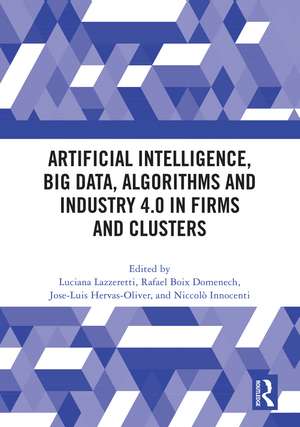Artificial Intelligence, Big Data, Algorithms and Industry 4.0 in Firms and Clusters
Editat de Luciana Lazzeretti, Rafael Boix-Domenech, Jose-Luis Hervás-Oliver, Niccolò Innocentien Limba Engleză Hardback – 4 oct 2024
Drawing on theoretical, empirical, and qualitative studies and using local perspectives, the chapters in this book explore theoretical aspects of AI and its evolution in social sciences, focusing on industry 4.0, smart cities, big data, and other related topics. They examine the role of industrial robots in employment, productivity, and knowledge absorption in industrial districts. They also discuss innovation in the context of local production systems, AI ecosystems, and the growth and potential of the Metaverse. Taken together, the book offers insights to help understand the new dynamics generated by the advent of these technologies and how they may affect regions, cities, clusters, industries, and organizations, and identifies avenues for future research in the development of new trajectories for clusters and firms.
This book will be a key resource for scholars and advanced students in the fields of economics, geography, architecture, planning, and management as well as for interdisciplinary researchers who want to learn more about the development of new technologies, the relevance of AI, Big Data and I4.0 for firms and in relation to their adoption in clusters. This book was originally published as a special issue of European Planning Studies.
Preț: 1002.99 lei
Preț vechi: 1223.16 lei
-18% Nou
Puncte Express: 1504
Preț estimativ în valută:
191.98€ • 208.61$ • 161.37£
191.98€ • 208.61$ • 161.37£
Carte tipărită la comandă
Livrare economică 21 aprilie-05 mai
Preluare comenzi: 021 569.72.76
Specificații
ISBN-13: 9781032846934
ISBN-10: 1032846933
Pagini: 206
Dimensiuni: 174 x 246 mm
Greutate: 0.53 kg
Ediția:1
Editura: Taylor & Francis
Colecția Routledge
Locul publicării:Oxford, United Kingdom
ISBN-10: 1032846933
Pagini: 206
Dimensiuni: 174 x 246 mm
Greutate: 0.53 kg
Ediția:1
Editura: Taylor & Francis
Colecția Routledge
Locul publicării:Oxford, United Kingdom
Public țintă
Postgraduate, Undergraduate Advanced, and Undergraduate CoreCuprins
Introduction: Artificial intelligence, big data, algorithms and Industry 4.0 in firms and clusters 1. The emergence of artificial intelligence in the regional sciences: a literature review 2. Artificial intelligence in hospitality and tourism. State of the art and future research avenues 3. Learning as imitation or mimesis: how ‘smart’ is machine learning for its planning controllers? 4. Does regional innovation policy really work for Industry 4.0? Evidence for industrial districts 5. The actors’ role in industrial districts facing the challenge of technologies 4.0 between absorption and dissemination 6. Robots and the productivity of local manufacturing systems in Emilia-Romagna: the mediating role of occupational similarity and complexity 7. Living innovation machines: modelling innovation in time and space variable-geometry territorial units using machine learning 8. The mechanisms underlying the emergence of innovation ecosystems: the case of the AI ecosystem in Montreal 9. How real will the metaverse be? Exploring the spatial impact of virtual worlds
Notă biografică
Luciana Lazzeretti is Full professor of Management at the Department of Economics and Management, University of Florence, Italy.
Rafael Boix Domenech is Full professor of Economic Structure at the Faculty of Economics, Department of Economic Structure, University of Valencia, Spain.
Jose-Luis Hervas-Oliver is Full professor of Management at the Departamento de Organización de Empresas, Universitat Politècnica de València, Spain.
Niccolò Innocenti is Assistant professor of Management at the Department of Economics and Management, University of Florence, Italy.
Rafael Boix Domenech is Full professor of Economic Structure at the Faculty of Economics, Department of Economic Structure, University of Valencia, Spain.
Jose-Luis Hervas-Oliver is Full professor of Management at the Departamento de Organización de Empresas, Universitat Politècnica de València, Spain.
Niccolò Innocenti is Assistant professor of Management at the Department of Economics and Management, University of Florence, Italy.
Descriere
This volume offers a diverse discussion on the interrelations among AI, algorithms, big data, and Industry 4.0 to understand the importance of these paradigms for the development of firms, districts, clusters, cities, regions, and innovation.
This book was originally published as a special issue of European Planning Studies.
This book was originally published as a special issue of European Planning Studies.
